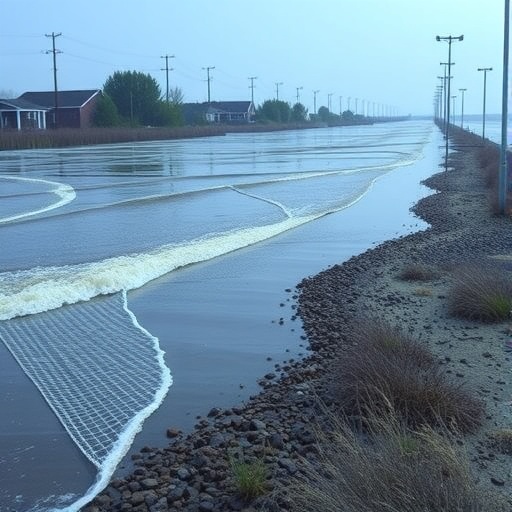Coastal flooding has emerged as a pressing issue globally, fueled by climate change and rising sea levels. The increasing frequency of extreme weather events has necessitated innovative solutions to predict and manage these disasters. In this climate of urgency, researchers have turned to machine learning as a powerful tool to analyze complex datasets and provide insights that could mitigate the impacts of coastal flooding. The study conducted by Babati et al. highlights the growing importance of artificial intelligence in addressing environmental challenges.
Machine learning, a subset of artificial intelligence, involves the use of algorithms and statistical models to perform specific tasks without explicit instructions. Through training on large datasets, machine learning models can identify patterns and relationships that might not be evident through traditional analytical methods. The application of machine learning to coastal flooding scenarios presents an opportunity to improve prediction accuracy and response strategies significantly.
One of the primary challenges in predicting coastal flooding is the sheer volume of data generated from various sources, including climate models, oceanographic data, and demographic statistics. These data points often require sophisticated analysis techniques to glean meaningful insights. By leveraging machine learning, researchers can integrate and analyze diverse datasets more effectively, enabling them to forecast flooding events more reliably.
The study presents a comprehensive approach to utilizing machine learning in coastal flooding assessments. Researchers employed various supervised and unsupervised learning algorithms to analyze historical data on coastal flooding incidents. This analysis aimed to identify risk factors, assess vulnerability, and predict potential future flooding events based on climatic variables. The models demonstrated impressive accuracy in predicting flood zones, which is essential for developing contingency plans and early warning systems.
Additionally, Babati et al. emphasized the role of machine learning in enhancing resilience among coastal communities. By providing accurate predictions and risk assessments, local governments can allocate resources more effectively, develop efficient evacuation plans, and implement preventive measures to protect infrastructure. This proactive approach can save lives and minimize economic losses during flooding events.
Another significant aspect of the study is the application of machine learning for real-time monitoring of coastal regions. Using sensor data and satellite imagery, machine learning algorithms can continuously evaluate conditions and provide timely alerts about potential flooding. This capability is critical for communities that may be at risk but lack adequate infrastructure to support traditional monitoring methods.
Furthermore, the versatility of machine learning allows for the incorporation of novel data sources into predictive models. Researchers have started to investigate the potential of social media data, as crowd-sourced information can provide immediate reports of environmental conditions. Analyzing this data alongside traditional sources could enhance the accuracy of flood predictions and provide communities with up-to-date information during emergencies.
Despite the promise of machine learning in addressing coastal flooding, the study also highlights the challenges that lie ahead. Data quality and availability remain critical issues, as many coastal regions lack comprehensive datasets. There is also a risk of overfitting models to specific datasets, which could limit their applicability in different geographical areas. To maximize the benefits of machine learning, ongoing efforts must focus on improving data collection methods and ensuring that algorithms are robust and adaptable to various environments.
The potential implications of these findings extend beyond coastal zones, providing a framework for other climate-related challenges. From urban flooding to drought prediction, the techniques developed in this research could inform a wide range of climate resilience initiatives. By embracing advancements in machine learning, scientists and policymakers can collaboratively tackle some of the most pressing environmental issues of our time.
Importantly, the intersection of technology and environmental science not only offers innovative solutions but also enriches our understanding of complex systems. The interdisciplinary nature of machine learning fosters collaboration among data scientists, climatologists, and urban planners, leading to more integrative approaches to environmental problem-solving. This collaborative effort is vital in building comprehensive strategies for managing present and future climate risks.
As we move forward, the significance of machine learning in mitigating coastal flooding will likely grow, driven by the urgency of climate change and the increased vulnerability of coastal regions. By harnessing technological advancements, scientists can develop smarter models that provide critical insights to inform policy and community-level decisions. The stakes are high, and the time for action is now. The future of coastal communities may hinge on our ability to innovate and adapt in the face of environmental challenges.
The ongoing work conducted by Babati et al. reinforces the notion that proactive measures informed by data-driven insights can pave the way for more resilient coastal communities. By embracing machine learning technologies, stakeholders can better manage the complexities of coastal flooding and create sustainable solutions that safeguard lives and livelihoods. As we continue to explore and implement these strategies, we must also ensure that they are accessible and equitable for all affected populations, reinforcing the importance of inclusive decision-making in our climate response efforts.
In conclusion, the study by Babati et al. underscores a pivotal moment in the evolution of flood prediction methodologies. By integrating machine learning approaches into coastal flooding analyses, we can anticipate a future where communities are not merely reactive but proactive in their response to climate change. This transformative shift holds the promise of safeguarding vulnerable populations and enhancing the sustainability of our coastal ecosystems for generations to come.
Subject of Research: Application of machine learning for coastal flooding.
Article Title: Application of machine learning for coastal flooding.
Article References:
Babati, Ah., Isa, Z., Abdussalam, A.F. et al. Application of machine learning for coastal flooding.
Discov Cities 2, 80 (2025). https://doi.org/10.1007/s44327-025-00125-8
Image Credits: AI Generated
DOI: https://doi.org/10.1007/s44327-025-00125-8
Keywords: machine learning, coastal flooding, climate change, resilience, predictive modeling.




